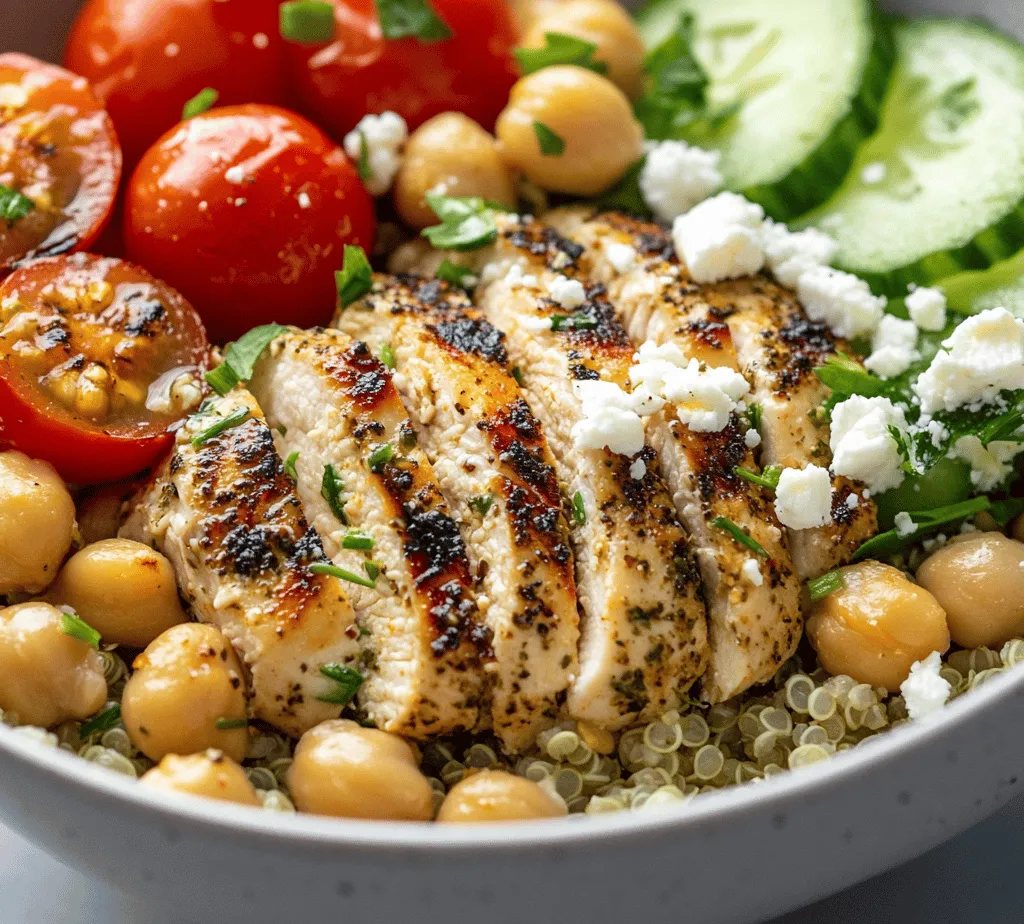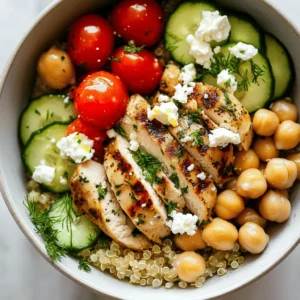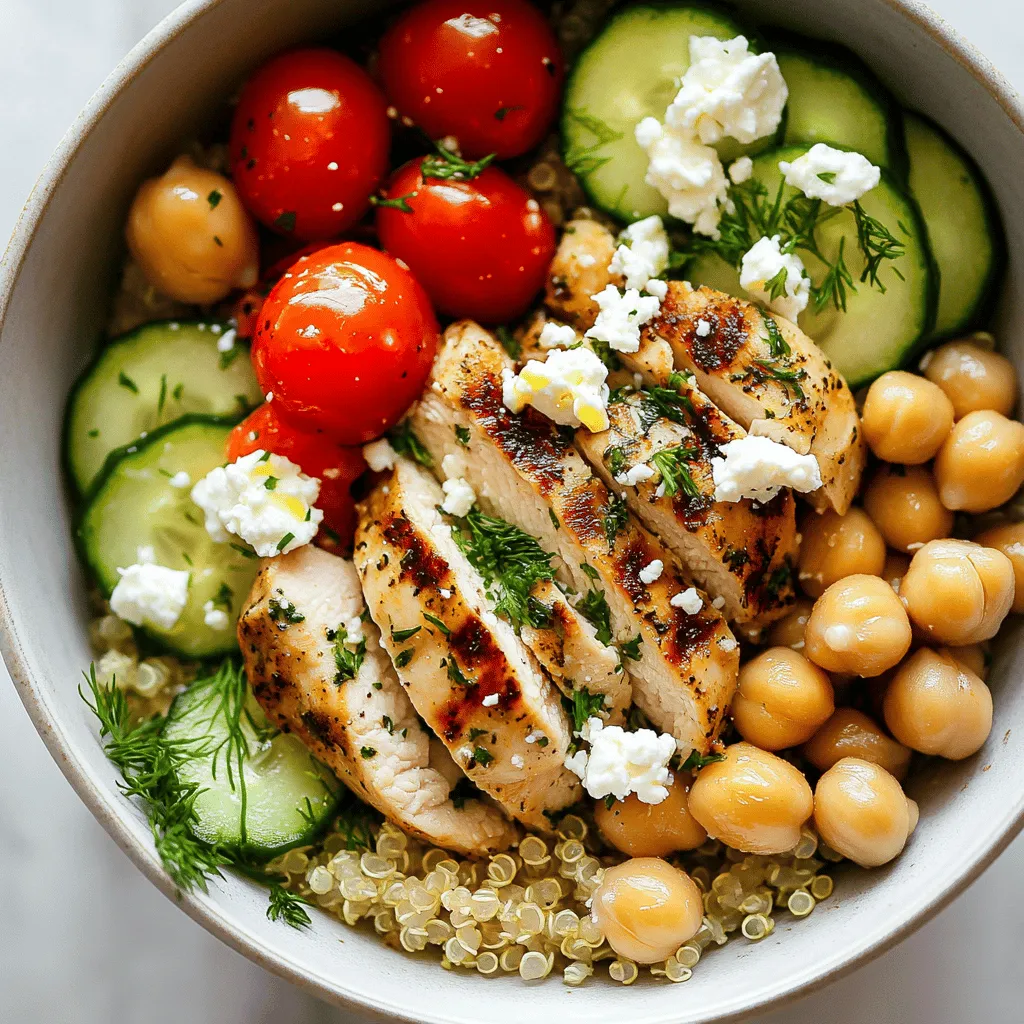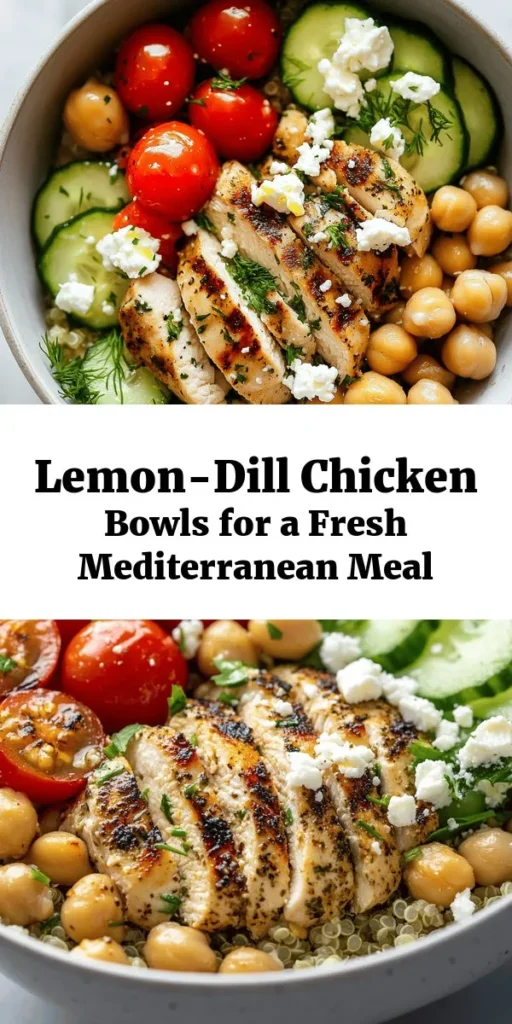Introduction to Mediterranean-Inspired Lemon-Dill Chicken Bowls
In the world of culinary delights, Mediterranean cuisine stands out for its vibrant flavors, fresh ingredients, and health benefits. One dish that encapsulates these attributes perfectly is the Mediterranean-Inspired Lemon-Dill Chicken Bowl. This recipe not only promises a burst of flavor with every bite but also showcases the wholesome elements of the Mediterranean diet, making it an appealing choice for health-conscious individuals and food lovers alike.
The popularity of Mediterranean cuisine can be attributed to its emphasis on fresh vegetables, lean proteins, and healthy fats. With a rich history that spans across countries like Greece, Italy, and Spain, this culinary tradition is celebrated for its ability to create delicious meals that are as nutritious as they are satisfying. The Mediterranean-Inspired Lemon-Dill Chicken Bowl is a stellar example, combining tender chicken marinated in zesty lemon and aromatic dill, served atop a bed of fluffy quinoa and accompanied by a medley of colorful vegetables.
This dish is not just about taste; it’s also packed with nutritional benefits. Chicken breast provides a lean source of protein, while quinoa serves as a gluten-free grain filled with essential amino acids. The vibrant vegetables—ripe tomatoes, crisp cucumbers, and crunchy red onions—not only add color but also enhance the dish’s nutritional profile with vitamins and minerals. The addition of chickpeas introduces extra protein and fiber, making this bowl a complete meal that keeps you energized throughout the day.
Understanding the Ingredients
To create the perfect Mediterranean-Inspired Lemon-Dill Chicken Bowl, it’s crucial to understand the key ingredients and their significance. Each component plays a vital role in both flavor and nutrition, ensuring that every bite is a delightful experience.
Boneless, Skinless Chicken Breasts
At the heart of this dish is boneless, skinless chicken breasts. This choice of protein is not only lean but also incredibly versatile. Chicken breasts are low in fat and high in protein, making them an ideal option for those looking to maintain a healthy diet or build muscle. The neutral flavor of chicken allows it to absorb the marinade beautifully, resulting in juicy, flavorful bites that are sure to satisfy.
Olive Oil
A staple in Mediterranean cooking, olive oil is renowned for its health benefits. Rich in monounsaturated fats and antioxidants, it promotes heart health and reduces inflammation. In this recipe, olive oil serves as the base for the marinade, infusing the chicken with a rich, fruity flavor while keeping it moist during cooking. Opting for high-quality extra-virgin olive oil can elevate the dish, enhancing its overall flavor profile.
Lemon Zest and Juice
Lemon zest and juice are vital to achieving the bright, tangy flavor that characterizes this dish. The acidity of lemon juice not only enhances the taste but also helps tenderize the chicken, resulting in a more succulent texture. Additionally, lemons are packed with vitamin C, which supports the immune system and enhances iron absorption from other ingredients. The zest, with its concentrated oils, adds an aromatic quality that complements the dill perfectly.
Fresh Dill
Dill is an herb commonly used in Mediterranean cuisine, known for its unique flavor that is both refreshing and slightly sweet. In this recipe, fresh dill adds a burst of flavor that pairs beautifully with the lemon, creating a harmonious balance. Beyond its culinary uses, dill is also rich in antioxidants and has been linked to digestive health, making it a beneficial addition to any meal.
Quinoa
As the base of the bowl, quinoa is a nutritional powerhouse. This ancient grain is a complete protein, containing all nine essential amino acids, making it an excellent choice for vegetarians and meat-eaters alike. Quinoa is also high in fiber, which aids digestion and promotes a feeling of fullness. Cooking it to a fluffy texture provides a perfect canvas for the marinated chicken and vibrant vegetables.
Colorful Vegetables: Tomatoes, Cucumbers, and Red Onion
The inclusion of colorful vegetables is essential not only for visual appeal but also for their nutritional contributions. Ripe tomatoes are rich in vitamins A and C, along with antioxidants like lycopene, which is known for its heart health benefits. Crisp cucumbers offer hydration and a refreshing crunch, while red onions add a subtle sweetness and a boost of antioxidants. Together, these vegetables enhance the flavor profile of the bowl while providing a variety of essential nutrients.
Chickpeas
Chickpeas, or garbanzo beans, are a fantastic source of plant-based protein and fiber, making them a valuable addition to the bowl. They contribute to the dish’s heartiness while adding a creamy texture that contrasts beautifully with the other ingredients. Chickpeas are also known for their versatility and ability to absorb flavors, making them an excellent companion to the lemon-dill chicken.
Feta Cheese
As a finishing touch, crumbled feta cheese adds a creamy, tangy element that elevates the dish. Feta is a staple in Mediterranean diets and offers a good source of protein and calcium. Its salty flavor complements the freshness of the vegetables and the zestiness of the chicken, bringing the entire bowl together. For those watching their dairy intake, a dairy-free feta alternative can also work well.
Fresh Parsley
Finally, fresh parsley serves as both a garnish and a flavor enhancer. Its bright, herbaceous notes add a fresh finish to the dish, making it visually appealing. Parsley is also rich in vitamins K and C, as well as antioxidants, contributing additional health benefits to the meal.
Marinating the Chicken for Flavor
Marinating the chicken is a crucial step that takes the flavor profile of this dish to the next level. The process allows the chicken to absorb all the aromatic elements of the marinade, resulting in a tender and flavorful protein that is the highlight of the bowl.
Creating the Marinade
To create the marinade for the Lemon-Dill Chicken, start by combining olive oil, freshly squeezed lemon juice, lemon zest, chopped fresh dill, minced garlic, salt, and pepper in a mixing bowl. Each ingredient plays a significant role: the olive oil acts as the fat that carries flavors, lemon provides acidity, dill adds freshness, and garlic infuses a savory note. Whisk these ingredients together until fully combined, creating a vibrant marinade that will enliven the chicken.
Recommended Marinating Times
For optimal flavor absorption, it’s recommended to marinate the chicken for at least 30 minutes. However, for even more intense flavor, consider marinating it for up to 2 hours or overnight in the refrigerator. This allows the acids in the lemon juice to penetrate the chicken while also keeping it moist during cooking. Remember to place the chicken and marinade in a sealed bag or container to prevent any spills and to enhance the marinating process.
Effects of Marinating on Chicken Texture
Marinating not only enhances the flavor but also affects the chicken’s texture. The acid from the lemon juice breaks down the protein fibers in the chicken, resulting in a more tender and juicy final product. This is especially important for lean cuts of chicken, which can easily become dry when cooked. The combination of marinating time and the right balance of ingredients ensures that you achieve succulent chicken that is bursting with flavor.
Cooking the Quinoa: A Nutritious Base
While the chicken marinates, you can prepare the quinoa, ensuring it serves as a nutritious and flavorful base for your bowl.
Rinsing Quinoa
Start by rinsing the quinoa under cold water. This step is crucial, as it removes the saponins, a natural coating that can impart a bitter flavor to cooked quinoa. Use a fine-mesh strainer and rub and swish the quinoa with your hands while rinsing to ensure all the bitterness is washed away.
Cooking Quinoa
To cook quinoa, combine 1 cup of rinsed quinoa with 2 cups of water or broth in a medium saucepan. Using broth, whether chicken or vegetable, adds an extra layer of flavor to the quinoa, enhancing its overall taste. Bring the mixture to a boil over medium-high heat, then reduce the heat to low, cover the pot, and let it simmer for about 15 minutes. After this time, remove the pot from heat and let it sit, covered, for an additional 5 minutes. This resting period allows the quinoa to absorb any remaining liquid and steam, resulting in fluffy grains.
Achieving Fluffy Quinoa
To achieve the perfect fluffy texture, be sure to follow a few key tips. First, avoid stirring the quinoa while it cooks, as this can cause it to become mushy. Instead, let it simmer undisturbed. After the resting period, use a fork to fluff the quinoa gently, separating the grains without crushing them. This simple step will yield a beautiful, light base for your Lemon-Dill Chicken Bowl.
Grilling the Chicken: Techniques for Perfection
Once the chicken has marinated and the quinoa is perfectly cooked, it’s time to grill the chicken, bringing out its delicious flavors and achieving that sought-after char.
Preparing the Grill
Preheat your grill to medium-high heat. A hot grill is essential for achieving those beautiful grill marks and locking in flavor. If you’re using a grill pan on the stovetop, add a touch of olive oil to prevent sticking and enhance the flavor of the chicken.
Grilling Chicken
Remove the chicken from the marinade, allowing any excess liquid to drip off. Place the chicken breasts on the preheated grill, ensuring they are spaced adequately to allow for even cooking. Grill the chicken for about 6-7 minutes on one side without moving it, letting it develop a nice sear. Flip the chicken and grill for an additional 5-7 minutes on the other side, depending on the thickness of the breasts. The chicken is done when it reaches an internal temperature of 165°F (75°C).
Resting the Chicken
Once cooked, remove the chicken from the grill and let it rest for a few minutes before slicing. Resting allows the juices to redistribute throughout the meat, ensuring that each bite remains juicy and flavorful.
With the chicken perfectly grilled and the quinoa ready, you are just steps away from assembling your Mediterranean-Inspired Lemon-Dill Chicken Bowls, packed with flavor, color, and nutrition. Stay tuned for the next part, where we will guide you through the final assembly and presentation of this delightful dish.

Importance of Cooking Chicken to the Right Temperature
Cooking chicken to the right internal temperature is crucial for both safety and flavor. The USDA recommends an internal temperature of 165°F (75°C) for all poultry products, including chicken breasts and thighs. Cooking chicken to this temperature ensures that any harmful bacteria, such as Salmonella or Campylobacter, are effectively destroyed, making your meal safe to enjoy.
Using a meat thermometer is the best way to check the temperature. Insert the thermometer into the thickest part of the chicken, avoiding bones, which can give a false reading. Once the chicken reaches 165°F, remove it from the heat to prevent it from becoming dry and overcooked.
Comparison of Grilling vs. Skillet Cooking Methods
When it comes to cooking chicken for Mediterranean-inspired lemon-dill bowls, you have two popular methods: grilling and skillet cooking. Each method offers distinct advantages, depending on your preferences and available equipment.
– Grilling: Grilling imparts a delicious smoky flavor and creates those coveted grill marks that enhance the dish’s presentation. It’s ideal for outdoor cooking, allowing fat to drip away, which can result in a leaner meal. Grilled chicken also typically cooks faster, reducing the overall cooking time.
– Skillet Cooking: On the other hand, skillet cooking allows for more control over the cooking process. You can easily adjust the heat to prevent burning and can also utilize the flavorful drippings to create a sauce or glaze. This method is perfect for indoor cooking and is particularly convenient when weather conditions don’t permit grilling.
Tips for Achieving Grill Marks and a Perfect Sear
To achieve beautiful grill marks and a perfect sear on your chicken, follow these tips:
1. Preheat the Grill: Always preheat your grill for at least 10-15 minutes before placing your chicken on it. This ensures that the surface is hot enough to create those attractive grill marks.
2. Oil the Grates: Use a paper towel dipped in oil to carefully wipe the grill grates. This prevents the chicken from sticking and helps achieve a better sear.
3. Don’t Overcrowd: Give each piece of chicken enough space on the grill. Overcrowding can lead to uneven cooking and prevent those beautiful grill marks from forming.
4. Leave It Alone: After placing the chicken on the grill, resist the temptation to flip it too soon. Let it cook on one side until it naturally releases from the grill, which usually takes about 5-7 minutes. Then, flip it and repeat.
5. High Heat for Searing: Start cooking the chicken over high heat for searing, then move it to a cooler part of the grill to finish cooking through.
Understanding Resting Time for Chicken to Retain Juices
After cooking, let your chicken rest for at least 5-10 minutes before slicing. Resting allows the juices to redistribute throughout the meat, resulting in a juicier and more flavorful chicken. If you cut into the chicken immediately after cooking, the juices will run out, leaving you with a dry piece of meat. Cover the chicken loosely with foil during this time to keep it warm.
Preparing the Fresh Vegetable Mixture
Incorporating fresh vegetables into your lemon-dill chicken bowls not only adds crunch but also boosts the nutritional profile of your meal. Fresh vegetables are packed with vitamins, minerals, and fiber, making them essential for a healthy diet.
Step-by-Step Guide to Preparing the Vegetable Mix
1. Choose Your Vegetables: Select a variety of colorful vegetables. Great options include bell peppers, cucumbers, cherry tomatoes, and red onions. Consider adding leafy greens like spinach or arugula for an extra nutrient boost.
2. Wash and Chop: Thoroughly wash all vegetables to remove any dirt or pesticides. Chop them into bite-sized pieces for easy eating and even distribution in your bowls.
3. Combine Ingredients: In a large mixing bowl, combine the chopped vegetables.
4. Add Fresh Herbs: Incorporate fresh herbs such as parsley or mint to enhance the flavors. A sprinkle of dill will also tie back to the chicken’s seasoning.
Flavoring Tips for Enhancing the Vegetable Combination
To elevate the flavor of your vegetable mixture, consider these tips:
– Zest and Juice: Add lemon zest and a splash of lemon juice to the vegetable mix for a refreshing zing that complements the chicken.
– Olive Oil Drizzle: A light drizzle of high-quality extra virgin olive oil can enhance the flavors and provide healthy fats.
– Seasoning: Sprinkle with salt, pepper, and perhaps a dash of red pepper flakes for a hint of heat.
Visual Appeal: The Importance of Colors and Textures in the Dish
A well-constructed dish is not only about taste but also about visual appeal. Utilize a rainbow of vegetables to create a vibrant and enticing bowl. The contrast of colors not only makes the dish more attractive but also indicates a variety of nutrients, ensuring a balanced meal. Textures play a crucial role as well; the crunchiness of fresh vegetables paired with tender chicken creates an enjoyable eating experience.
Assembling the Mediterranean-Inspired Bowls
Now that you have your chicken and vegetable mixture ready, it’s time to assemble your Mediterranean-inspired bowls.
Aesthetics of Bowl Assembly: Layering for Visual Appeal
Layering is key to creating a beautiful presentation. Begin with a base of your chosen grain, such as quinoa or brown rice, then layer the chicken and vegetable mix on top.
Step-by-Step Assembly Instructions
1. Grain Base: Start with a generous scoop of cooked quinoa or brown rice at the bottom of the bowl.
2. Chicken Placement: Slice the rested chicken and arrange it on top of the grain base.
3. Vegetable Mix: Add a colorful portion of your vegetable mixture next to the chicken, allowing the colors to contrast beautifully.
4. Garnishing: Finish with a sprinkle of fresh herbs, a wedge of lemon on the side, and a drizzle of olive oil if desired.
Importance of Portion Control and Balanced Nutrition
When assembling your bowls, aim for balance. Ensure each component—grains, protein, and vegetables—is adequately represented. This not only promotes portion control but also ensures you’re consuming a well-rounded meal, rich in macronutrients and micronutrients.
Suggestions for Customizing the Bowls Based on Dietary Preferences
The Mediterranean-inspired chicken bowls are incredibly versatile. Here are some customization ideas:
– Vegan Option: Substitute chicken with grilled tofu or chickpeas, seasoned with lemon and dill.
– Low-Carb Option: Replace grains with spiralized zucchini or cauliflower rice to reduce carbohydrates.
– Add Extra Protein: Consider adding feta cheese, nuts, or seeds for additional protein and healthy fats.
Serving Suggestions and Pairings
To elevate your meal further, consider the following serving suggestions:
Ideal Serving Temperature and Presentation Tips
Serve the bowls warm, ensuring that the chicken is still at the optimal temperature. For an appealing presentation, use wide, shallow bowls that allow for the colorful ingredients to shine.
Suggested Side Dishes or Beverages to Complement the Meal
Pair your bowls with a light side salad dressed with lemon vinaigrette or a refreshing tzatziki sauce. For beverages, a glass of chilled white wine or sparkling water with lemon slices would complement the Mediterranean theme beautifully.
The Role of Additional Lemon Juice or Olive Oil for a Finishing Touch
A final squeeze of fresh lemon juice over the assembled bowls can brighten the dish and enhance the flavors. A drizzle of high-quality olive oil not only adds richness but also boosts the healthy fat content, making your meal more satisfying.
Nutritional Benefits of the Lemon-Dill Chicken Bowls
This dish is not only flavorful but also packed with nutritional benefits.
Analysis of the Dish’s Overall Health Benefits
The combination of lean protein, healthy fats, and fiber-rich vegetables makes these bowls a powerhouse of nutrition. They support muscle growth, digestion, and overall health.
Breakdown of Macronutrients: Protein, Fats, and Carbohydrates
– Protein: Chicken is an excellent source of protein, which is crucial for muscle repair and satiety.
– Fats: Healthy fats from olive oil and nuts contribute to heart health and help absorb fat-soluble vitamins.
– Carbohydrates: Whole grains like quinoa provide complex carbohydrates for sustained energy.
High Fiber Content from Quinoa and Vegetables
Quinoa is a fantastic source of dietary fiber, which aids in digestion and promotes feelings of fullness. The addition of various vegetables further enhances the fiber content, supporting gut health.
Antioxidant Properties of Ingredients Like Tomatoes and Garlic
Tomatoes and garlic contribute antioxidants that combat oxidative stress in the body. Tomatoes are rich in lycopene, while garlic provides allicin, both of which are associated with numerous health benefits.
Conclusion: Embracing Mediterranean Flavors at Home
The Mediterranean-inspired lemon-dill chicken bowls offer a delightful blend of flavors, colors, and textures, making them a perfect meal for any occasion. With their health benefits and vibrant presentation, these bowls are sure to impress your family and friends.
Don’t hesitate to experiment with variations of this recipe. The beauty of Mediterranean cuisine lies in its versatility, allowing you to adapt ingredients based on your personal tastes and dietary needs. Embrace the joy of cooking healthy meals at home, and relish in the satisfaction that comes from sharing delicious, nutritious food with loved ones.



